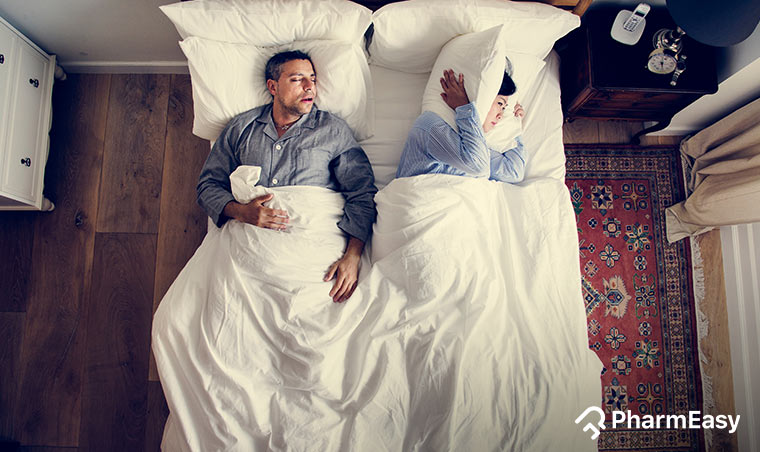Snoring And Sleep Apnea: Could There Be A Link?
By Dr. Nikita Toshi +2 more

Get,

to manage your symptom
Get your,


4 Cr+ families
benefitted

OTP sent to 9988776655



You’ve successfully subscribed to receive
doctor-approved tips on
Whatsapp

Get ready to feel your best.

Hi There,
Download the PharmEasy App now!!


Register to Avail the Offer
Send OTPBy continuing, you agree with our Privacy Policy and Terms and Conditions

Hi There,
Sign up on PharmEasy now!!
Trusted by 4 crore+ families

OTP sent to 9988776655



You have unlocked 25% off on medicines




Code: NU25
By Dr. Nikita Toshi +2 more
Table of Contents
Sleep Apnea is a common sleep disorder caused when low levels of oxygen reach the brain during sleep. It hinders normal breathing patterns for about 10 seconds or longer during sleep and this is known as apnea. Due to this, your sleep will be interrupted several times as you will be compelled to briefly awaken to breathe better. Sometimes you may make a sound when your breathing is obstructed which is referred to as snoring. Snoring happens when the air flowing through the nose and airways causes the tissues to vibrate. Snoring can be occasional or regular with some people and can lead to serious health concerns as well. On other occasions, it can also be an indication of a serious underlying condition such as sleep apnea. Snoring not only hampers the sleep cycle and sleep quality but can also make the person feel irritated, anxious and exhausted.
Apart from these symptoms, sleep apnea may even cause insomnia, mood swings, sexual dysfunction, or unnatural weight gain. It further puts a person at risk of stroke, high blood pressure, heart failure and diabetes.

The throat tissues sometimes relax too much to partially block your airway and cause vibrations. This is why people snore and the narrower the airway, the louder the noise gets.
Treatment of Sleep Apnea and management of sleep disorder is based on the severity of your condition, duration, signs and causes. It largely depends on the patient’s overall lifestyle and health condition. Depending on the underlying cause, your doctor will suggest suitable treatment options. If you are ready to embrace certain lifestyle changes, such as undergoing a weight loss program and using a breathing assistance device, your condition may improve to a great extent.
Physical exercise and weight loss can help treat sleep apnea. You must regularly perform aerobic activities and take care of your cardiovascular health. This reduces the risk of complications related to obesity and keeps you healthy.
Snoring, often with pauses, snorts or gasps between breaths, Heavy breathing while sleeping, Extremely restless sleep, Bedwetting are some of the common signs in children to diagnose sleep apnea, do note the condition manifests even in children and not just the adults.
Dr. Ashish Bajaj, M.B.B.S., M.D. in Clinical Pharmacology and Toxicology
While snoring may seem like a funny trivial issue, one should never ignore it. It might be the precursor to something more dangerous. Any kind of sleep disorder should be addressed and nipped in the bud by speaking to a doctor. It is not a good idea to rely on sleeping pills and home remedies to help solve the problem. A doctor will evaluate and diagnose your condition to suggest what’s best for you.
Disclaimer: The information provided here is for educational/awareness purposes only and is not intended to be a substitute for medical treatment by a healthcare professional and should not be relied upon to diagnose or treat any medical condition. The reader should consult a registered medical practitioner to determine the appropriateness of the information and before consuming any medication. PharmEasy does not provide any guarantee or warranty (express or implied) regarding the accuracy, adequacy, completeness, legality, reliability or usefulness of the information; and disclaims any liability arising thereof.
Links and product recommendations in the information provided here are advertisements of third-party products available on the website. PharmEasy does not make any representation on the accuracy or suitability of such products/services. Advertisements do not influence the editorial decisions or content. The information in this blog is subject to change without notice. The authors and administrators reserve the right to modify, add, or remove content without notification. It is your responsibility to review this disclaimer regularly for any changes.

Leave your comment...
Comments